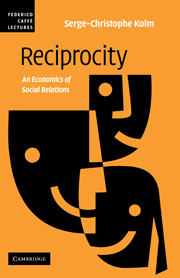2 - Evidence and scope
Published online by Cambridge University Press: 22 September 2009
Summary
Scope and role
All social relations and interactions probably have a dimension of reciprocity. You are more favourable to other people when other people are more favourable to you. You are less hostile to them when they are less hostile towards you. This is the consequence of a sense of balance and equity (or a desire of revenge), of liking of all kinds and intensities, and sometimes of interest in pursuing the relation. Some relations are only reciprocity (such as actually providing a return gift). Reciprocity can also be an essential part of the relationship, as within families with emphasis on affection. It is more or less important in other cases, as with relationships within communities of all types and more or less tight or loose – nation, local community, kinship, culture, workplace, organization, class or caste and the general community of mankind. Moreover, all peaceful and free relationships are based on a basic reciprocity of respect of others and their property, if the expression “peaceful and free” excludes the protracted war of an exclusive balance of threats (a generally unstable state that tends to erupt in overt violence or to lead to the political agreement shortly discussed). This provides general sociability and permits, in particular, standard (market) exchange and cooperation, and the working of organizations of all types.
Let us make this later point precise. Thomas Hobbes told us that human societies are trapped in a dreadful dilemma.
- Type
- Chapter
- Information
- ReciprocityAn Economics of Social Relations, pp. 33 - 49Publisher: Cambridge University PressPrint publication year: 2008



